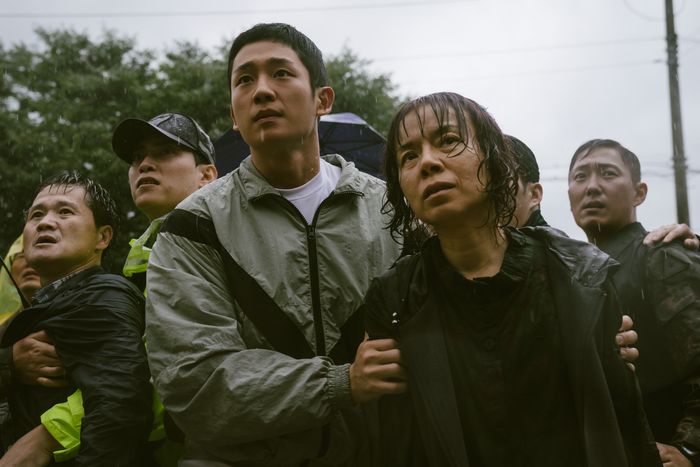
In the Netflix K-drama D.P., men and fear are intertwined. Within the rigid hierarchies of the exclusively male world of South Korean national service, directionless men pulled from their daily lives uphold the abusive system because they’re afraid: afraid of standing out, of looking weak, of what their fear really says about them.
In a K-drama landscape that so often errs on the bright side, D.P. creator Kim Bo-tang (adapting the series from his own webtoon) instead shows us a grim underworld right in front of our eyes. This is a world powered by men spectacularly ill-equipped to lead, who are so afraid of the abuse of their superiors that they simply visit the same violence upon their perceived subordinates, all to continue a cycle of toxic masculinity in an otherwise celebrated male system.
It’s this system into which Ahn Jun-ho (Jung Hae-in) falls. Plucked from a delivery job, he is an outward exemplifier of the South Korean military: young, fit, cheekbones for days. Yet inside, he couldn’t be more removed from the boorish, misogynistic world maintained in barracks. He’s simply a confused, directionless young man thrown into a group of other confused young men.
Yet, where everyone else’s fear seems to manifest as violence, Jun-ho’s fear elicits in him an overwhelming empathy. This should mark Jun-ho as a target for the hazing and intense bullying from his peers. He is, however, spared the ordeal after impressing Park Boem-gu (Kim Sung-kyung), who assigns him to the D.P. unit — for “deserter pursuit.” That this role allows Jun-ho to leave the base allows for a slice of normalcy in an otherwise rigid world. It also grants us a curious contrast between the constricting regime of military life and the world outside, at once permissive by comparison and yet clueless of everything Jun-ho has already experienced.
It’s notable that D.P. is set in 2014, a tragic year in South Korea and a scandalous one for the military. In June, a 22-year-old shot and killed five fellow soldiers and injured seven others, sparked by intense abuse and the apathy of his superiors. Several months later, a 20-year-old soldier died as the result of abuse from superiors. Both events shook South Korea and raised serious questions about conditions within national service; both are represented in facsimile in D.P.’s first season.
The South Korea Jun-ho sees on his first jaunt off base is one on the cusp of that tragedy, holding its breath in blissful ignorance before the storm breaks. The way Jung plays Jun-ho is less as an emotional man in a stubbornly taciturn concept of masculinity but rather someone already grieving that tragedy. As if, haunted by the lessons of his missions and the abuse he witnesses, he can already see what’s coming, even if he does not know the form it might take.
When his first mission ends in calamity, Jun-ho is paired with experienced D.P. Han Ho-yeol (Koo Kyo-hwan). A gregarious yet adept D.P., Ho-yeol forms a sharp contrast to the confusion and guilt that whirls around Jun-ho. It’s a setup that invokes a buddy-cop series, with each episode centering on a different pursuit and the implications they carry. Yet, hidden in that striking dynamic are two people at odds with the system in which they function, with both Jun-ho and Ho-yeol slowly understanding the responsibility they’ve been handed is too big for them. Despite being constantly told they are men, to act like men, to embody what it means to be a man, they are ultimately too young to understand the implications of what they’re doing until someone gets hurt — and people do get hurt.
The depiction of the realities of national service resonated with many veterans and made D.P. a domestic phenomenon. But it also grabbed a wider audience who could see the parallels between the feckless officers that allow, encourage, and even perpetrate abuse in the military and the toxic leadership they experience in their daily lives.
It’s odd, then, that the series isn’t bigger outside South Korea. With such an accessible and universal story, if any series could break through to a global audience, why not D.P.? The answer is simple: It was released a month before Squid Game. Though Squid Game languished in South Korea behind D.P. and then Hometown Cha Cha Cha, internationally we all caught Squid Game fever. D.P. never stood a chance.
It’s deeply unfair for a series so powerful and so competently crafted, one that embodies many of the themes that make other K-dramas popular in the west. A second season should have vindicated D.P. on the global stage, yet once again it had the misfortune to run up against another hugely popular import. This time, it was Hulu’s remarkable superhero drama Moving.
Does that make D.P. the unluckiest South Korean series in memory? It certainly has a claim. But what it says and what it does makes it well deserving of a second chance. We’ve seen examinations of toxic masculinity in television before, even of how it fuels power, its abuse, hypocrisy, and fragility. D.P., however, is one of those rare series that sympathizes with the men in power’s orbit, empathizes with the fear that drives them, yet never apologizes for them. It doesn’t grant those men a happy ending, it doesn’t envision reform. David, D.P. says, cannot contend with a Goliath unwilling or unable to change. Rather, D.P. shows us the real world reflected back at us, a world in which men are afraid, yes, but in which men are also willing participants in the systems of which they are also victims. It shows us all of this in a digestible form and asks us to have the insight, even the charity at times, to understand where fault truly lies.

